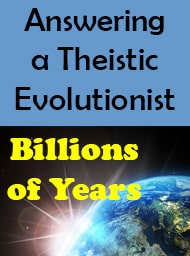July 7, 2019

Pointing out some alleged problems with the word “day” meaning a literal day, he goes on to state:
However, all but the seventh day end with the words “and there was evening and there was morning”. Also, in chapter 2:17 it says, “for in the DAY you eat from it you will certainly die”, but Adam didn’t die in that day, it took him 930 YEARS to die. Also, in chapter 2:4 it says “This is the history of the heavens and the earth in the time they were created in the DAY that God made earth and heaven”, but we have just been told that the creation took SIX DAYS not ONE DAY. So, as you can see from scripture the word “DAY” can be used to mean different things and not just one as you imply.
Response
Thank you for your concerned question. You are correct in stating the word “day” can have different meanings. However, there are some statements you made that I would like to address. Let me answer each one separately.
First, Genesis 2:17 (…for in the day that you eat of it you shall surely die.)
The literal translation for this verse is, “dying you will die”. This does not mean Adam would instantly die that day, but that the physical death process would begin. Even if the days were long ages, the argument still does not work. The Bible states that Adam lived to be 930 years old. How many long ages would 930 years be?
Second. Genesis 2:4 (This is the history of the heavens and the earth when they were created, in the day that the Lord God made the earth and the heavens.)
The phrase “in the day” is a Hebrew idiom for “when”. An idiom is when a phrase or expression can’t be understood from the ordinary meanings of the words in it. For example, “His boss threw him under the bus” is not meant to taken literally. It means his boss made him take the blame for what happened. Other common examples include:
- “I’m all ears” – You have my full attention.
- “It cost an arm and a leg” – It was expensive.
Therefore, in Genesis 2:4, the word “day” is not meant to be taken as a literal day. It refers to the entire creation week. An important concept is context. The word “day” (Hebrew yom) can have different meanings such as a literal day, a year, a season, a year, or an indefinite period of time. Two keys to determining the intended meaning of words are context and style of writing. In addition, in Genesis 1 the word “day” is coupled with a number and the phrase “evening and morning” which is always taken to mean a literal day. We do not see this construct in Genesis 2:4.
Third, Genesis 2:2-3 (the seventh day)
(And on the seventh day God ended His work which He had done, and He rested on the seventh day from all His work which He had done. Then God blessed the seventh day and sanctified it, because in it He rested from all His work which God had created and made.)
The argument mostly comes from people who hold to the day-age-theory. The argument is that since the phrase “evening and morning” is not used with the seventh day, it must not have been a 24-hour day. Therefore, we are living in the seventh day—a position day-age-theorist must defend to remain consistent. There are some serious problems with this approach.
- The word “day” has an ordinal number with it, which always means a literal day.
- It is an argument from absence. Just because it does not have “evening and morning” with it does not mean it can’t be a literal day. If this were the case, then it is an admission that the first six days were literal days.
- If it was not a day of twenty-four hours, then it has no resemblance to the sabbath which was given to the Israelites. In Exodus 20:9-11 and 31:15, 17, God makes a direct comparison of the six days of creation and a day of rest to the Israelites week of work six days and rest one. This comparison would make no sense if the seventh day referred to a long age.
- If the seventh day is continuing, then what about days eight, nine and ten…? Is the earth only 7 days old?
- Adam, the first man, was created on the sixth day. The Bible states that Adam lived to be 930 years old. How could he have lived to be 930 years old if the seventh day is still continuing?
- An argument used to support the seventh day is continuing is found in Hebrews 4, where it talks about God’s rest. The seventh day, the day that God rested, cannot be taken to mean God’s rest in Hebrews 4 because only believers enter God’s rest. If the seventh day is continuing it would mean non-believers also entered His rest, which contradicts Hebrews 4:5-6 where it states, “For He has spoken in a certain place of the seventh day in this way: “And God rested on the seventh day from all His works”; and again in this place: “They shall not enter My rest.” Since therefore it remains that some must enter it, and those to whom it was first preached did not enter because of disobedience,).
This passage in Hebrews is using the seventh day of creation to refer to the coming essence of heaven – a place of rest. It is not speaking about the actual length of that seventh day. Furthermore, when God completed the creation, He “rested” – but only from His work of creation. He is very much at work now – but in His work of redemption, not creation.
- There is nothing in the Bible to suggest the seventh day was longer than 24-hours. It is because some people’s starting point or presupposition is science and not the Bible. Because of this they assume the scientific evidence demands long ages and therefore, the plain reading of Scripture cannot be correct. There are three problems with this type of thinking.
-
-
- It goes against the clear teaching of the Bible (John 17:17, 2 Timothy 3:16-17). The Bible must be our authority in all matters, even when it appears the scientific evidence disagrees with Scripture.
- It compromises the foundation for the Gospel.
“Genesis lays a foundation that is absolutely necessary for understanding the gospel, and it serves as a model for how we should present gospel truth.” Philip Johnson (Executive Director of Grace to You), Answers Magazine, July, 2019. - The scientific evidence does not prove or even support the earth is billions of years old. There are many scientific evidences that support a young earth model of about 6,000 years as the Bible teaches.
-



